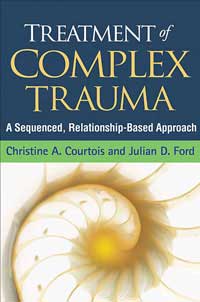 378 pages
378 pages12 CE credits
Course Enrollment
$240.00
Add to Cart
All exams are taken online. The exam for this course will be available in "My Courses" immediately upon enrollment. Note the book is not included.
The book is available for purchase from Amazon.
As an Amazon Associate we receive a rebate from qualifying purchases.
TREATMENT OF COMPLEX TRAUMA
A Sequenced Relationship-Based Approach
Christine A. Courtois, Ph.D and Julian D. Ford, Ph.DGuilford Press, 2015
DESCRIPTION
This insightful guide provides a pragmatic roadmap for treating adult survivors of complex psychological trauma. Christine Courtois and Julian Ford present their effective, research-based approach for helping clients move through three clearly defined phases of posttraumatic recovery. Two detailed case examples run throughout the book, illustrating how to plan and implement strengths-based interventions that use a secure therapeutic alliance as a catalyst for change. Essential topics include managing crises, treating severe affect dysregulation and dissociation, and therapist self-care. The companion website offers downloadable reflection questions for clinicians and extensive listings of professional and self-help resources. A new preface in the paperback and e-book editions addresses key scientific advances.
EDUCATIONAL OBJECTIVESThe reader will be able to:
• Analyze what constitutes complex trauma from the two extended case studies (fictional) presented in the book, and review the three broad categories of survivorship
• Apply specialized assessment tools to determine trauma history and aftereffects symptoms, such as PTSD
• Set goals with your clients that can be monitored and adjusted as needed therapy proceeds
• Ensure client safety as guided by Phase 1 of the three-phased model in the book
• Cultivate the therapeutic relationship by 'walking-the-walk' guidelines in the book
• Apply evidence-based strategies when helping clients in processing trauma memories
• Apply essential elements of the relationship-based treatment to facilitate focusing on the impact of traumatic experiences
• Tailor the three-phased sequenced model to apply interventions to each individual's needs and strengths
• Apply strategies to handle trauma-related transference and countertransference issues, and achieve perspective on your and your client's personal safety, psychological well-being, and life skills
• Describe best strategies for continuing treatment for later reprocessing of trauma when more can be faced
• Use the self-help and assessment resources in the book as well as the web link to supplementary resources (www.guilford.com/p/courtois2)
AUTHOR
Christine A. Courtois, Ph.D, is a consultant/trainer on topics on trauma psychology and treatment. She co-founded and then served for 16 years as Clinical and Training Director of The CENTER: Post-Traumatic Disorders Program, in Washington, DC. She was chair of the Clinical Practice Guideline for the Treatment of Post-Traumatic Stress Disorder in Adults for the APA. Julian D. Ford, Ph.D, a clinical psychologist, is Professor of Psychiatry, Psychology, and Law at the University of Connecticut, where he is also Director of the Center for Trauma Recovery and Juvenile Justice. He has served on the Steering Committee of the National Child Traumatic Stress Network, and as Co-Chair of the Presidential Task Force on Child Trauma for the APA.
EDITORIAL REVIEWS"Both authors have worked extensively with survivors of complex trauma, and share their wisdom and experience in this book. At a time when this clinical population is becoming more visible to clinicians, this thoughtful, extensively documented work is a real treasure. The book has already had a profound effect on the field, and has introduced many previously unaware clinicians to foundational concepts. The emphasis on therapist self-care and the ways in which the authors underscore the central importance of therapist self-awareness and self-regulation are particularly valuable."
--Laura S. Brown, PhD, ABPP, past president, Division of Trauma Psychology, American Psychological Association; private practice, Seattle, Washington
"Courtois and Ford, two internationally acknowledged experts, have written a magnificent book on the nature and phase-oriented treatment of complex trauma. Destined to become an instant classic, the book is illustrated throughout with instructive case material. It is at once an excellent guide for the uninitiated and an outstanding resource for experienced clinicians in the field. As most forms of complex trauma occur in interpersonal relationships, the book's emphasis on the therapeutic relationship as the vehicle for healing contributes to its importance."
--Onno van der Hart, PhD, Department of Clinical and Health Psychology (Emeritus), Utrecht University, The Netherlands
"Treatment of Complex Trauma is an excellent book for graduate Complex Trauma courses, as it provides a wide range of treatment strategies for clinicians to use with clients. The book give students a thorough understanding of PTSD and complex trauma. It offers a comprehensive overview of treatment measures, ways to build the therapeutic relationship, and clinician self-care."
--Toby Spiegel, PsyD, Associate Dean, School of Behavioral Sciences, California Southern University
"The state of the art of treating complex trauma, both the basics and the nuances, as summarized by two wise and sophisticated experts."
--Judith Lewis Herman, MD, Department of Psychiatry, Harvard Medical School
"Finally! We have long needed a clinical guidebook that takes treatment providers through the process of therapy for complex posttraumatic stress syndromes, which are among the greatest challenges that professionals encounter. Courtois and Ford's broad and deep clinical experience shines through in their discussion of assessment, engagement, and treatment--as do their optimism, passion, and hope."
--Sandra L. Bloom, MD, founder, The Sanctuary Model
"Courtois and Ford provide detailed guidelines for conducting their sequenced treatment approach, from preparation, assessment, and planning, to each of the phases of therapy. The book covers the 'meat and potatoes' of trauma therapy: ensuring client safety, cultivating the therapeutic relationship, and processing trauma memories. It includes strategies from different theoretical approaches and treatment modalities and addresses more complex processes, such as psychic emptiness and dissociation. Written with exceptional clarity, compassion, and respect, and richly illustrated with clinical material, this is an invaluable resource for clinicians."
--Sandra C. Paivio, PhD, CPsych, Department of Psychology, University of Windsor, Ontario, Canada
ISHK CE at Home
1702-L Meridian Ave., #266
San Jose, CA 95125-5586
This website uses cookies to ensure you get the best experience on our website. Learn more
